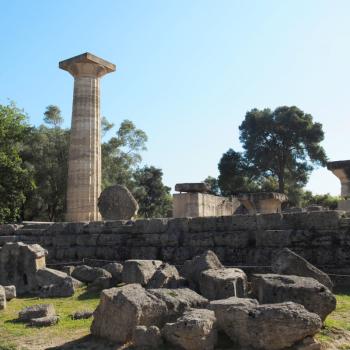I once heard a story* of an old rabbi who was preparing to attend an interfaith luncheon. His young assistant urged him not to go. “Rabbi, there are many closed-minded Christians in this group. They believe our religion is false and they will not treat you with the respect you deserve. Please don’t go.”
The old rabbi smiled. “What can they do? They will try to convert me. They will fail. Then we’ll sit down, have lunch, and go about doing God’s work.”
The questions of interfaith work and Pagan-Christian relations have been discussed rather loudly over the past several days. John W. Morehead, a Christian and an advocate for Pagan-Christian interfaith dialogue had a guest post on the Patheos Pagan channel titled Pagan-Christian Dialogue, Mistrust, and a Difficult (But Needful) Way Forward. Then on Saturday’s Wild Hunt, Jason Pitzl-Waters (who has participated in panel discussions on this topic) linked to this post with a brief quote.
Comments to both posts have been strong and generally negative. A few support the work, while some are using the opportunity to rehash old complaints with Christianity. Many are skeptical about Evangelical Christians’ commitment to dialogue and interfaith work with Pagans, assuming they’re there either to proselytize or to research Paganism to develop more effective approaches for proselytization.
This presumption of bad faith is not helpful to Pagans as individuals or to our movement as a whole.
The ground rules for interfaith work begin with the assumption of “no proselytization.” Dialogue is intended to help followers of different religions get to know each other as people and learn about other religions. It’s not intended to gloss over our theological, ethical and political disagreements, but to emphasize we all share one world and to work together on the matters where we do agree.
Do some Christians ignore the ground rules? I’m sure they do, and if they do they should be called on it: gently at first, more firmly if it continues. But what’s the risk for us? That someone will try to convert us? As the rabbi in the story said, they will fail.
The risks of participating in interfaith dialogue and projects are very small.
**********************
It pains me to confess, but in my younger days I was homophobic. Not hateful or mean-spirited but literally homophobic – afraid of the Unknown Other that was gay people.
And then I met Charlie. Charlie was a co-worker; a scheduler in a factory where I was an engineer. Charlie’s sexual orientation was the worst-kept secret in the plant. But he was a good guy – he worked hard, did quality work, was very dependable, told good jokes and was generally fun to be around. It was very easy working with him.
Charlie put a face and a name on the Unknown Other of gay people – and then they weren’t Unknown or Other any more. My fear melted away.
Last week we saw a shift in the debate over marriage equality when Republican Senator Rob Portman of Ohio changed his position after learning one of his sons is gay. This pattern has repeated over and over and over again – someone who was homophobic and/or opposed to marriage equality changes his mind because he realizes someone he knows is gay. Those who come out make the way easier for those who come after them.
There is still a lot of misunderstanding about Paganism. Few believe we’re evil any more – now our detractors simply think we’re flakes. Participating in interfaith work and talking with folks from other religions puts a face and a name to the Unknown Other that is “Pagans.” Then when they hear someone speaking of Pagans in inaccurate ways, they’ll compare that caricature to “Sally from the interfaith lunch” or “Joe from the shelter project” and realize our detractor doesn’t know what he’s talking about.
The main benefit for our movement isn’t that Christians think more highly of us. The main benefit for our movement is that the next time these Christians encounter a Pagan, they’ll treat her with more respect.
Paganism is still a very small, very new religion – we have little infrastructure. There are many times when if we want to do more than write a check we have no choice but to join in with an existing group, which may very well be a different religious group. Interfaith dialogue opens up opportunities for service to Pagans and others, which helps both the giver and the receiver.
The rewards of participating in interfaith projects and dialogue can be significant.
**********************
There are risks and rewards with interfaith work. There are also boundaries.
Despite my soft spot for the Catholic church, I have serious issues with their theology and doctrines. But I will happily set those issues aside and work with Catholics to end the death penalty. I have problems with Calvinism, but I will happily set those aside and work with Presbyterians on immigration reform. I have problems with aggressive atheists, but I will happily work with them to support good science education.
I can’t see any circumstances under which I would work with the Westboro Baptist Church on anything.
I don’t care if the people sitting across the interfaith table believe I’m going to hell – I do care if they act like I’m a danger to the souls of the community. I don’t care if they believe women shouldn’t be ordained – I do care if they treat the women we ordain (or initiate or elect) as equals.
Interfaith work is founded on the principle that what unites us is greater than what divides us. At some point the separation becomes too great. I can’t tell you where to draw the boundary – all I can tell you is that purity for the sake of purity isn’t much of a goal.
**********************
Talking with people of different religions is a good thing. Working with people of other religions to make our world a better place is a good thing. There can be problems, but the risks are small and the rewards can be great.
* If anyone knows the origins of this story, please let me know in the comments.

















